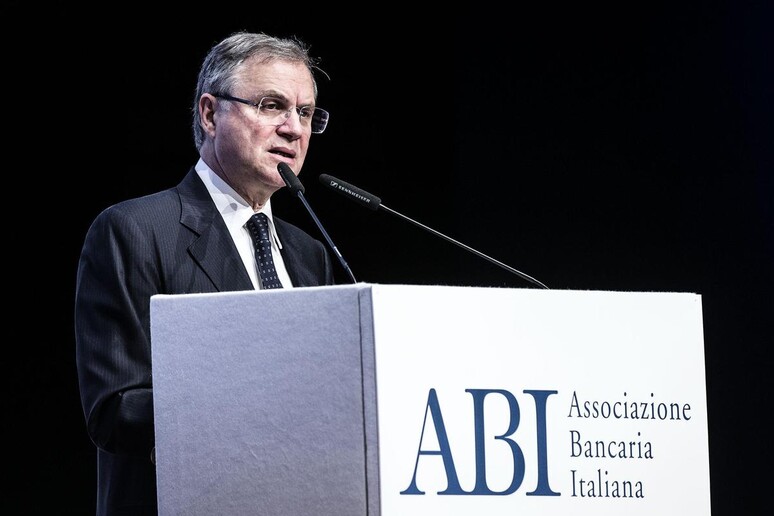Economy Minister Pier Carlo Padoan
and Bank of Italy Governor Ignazio Visco on Thursday separately
eyed growth and reckoned Italy's longest postwar recession was
coming to an end.
Meanwhile the head of the Italian Banking Association (ABI),
Antonio Patuelli, said the country needed to urgently act on
corruption and clean up banking and business practices to help
lift itself out of the seemingly endless downturn.
There are no shortcuts to economic growth, which requires a
multi-level strategy, Padoan told an ABI assembly.
Italy's priorities as European Union president are growth
and job creation, and the Economic and Financial Affairs Council
of EU foreign ministers that met two days ago strongly endorsed
these, Padoan said.
The outlook for growth is still "weak and uncertain, but
sustained growth is the way forward in order to cut Italy's
public debt," the minister went on.
"Without a doubt Italy must reduce its tax burden," Padoan
said, adding that "finance for growth" measures contained in
Premier Matteo Renzi's promised Unblock Italy decree will be
ready "within a few days," Padoan said.
The so-called Unblock Italy decree is designed to help
local administrations disentangle themselves from red tape and
other obstacles now paralyzing public works and infrastructure
projects.
"The financial system can and must contribute to reversing
the current economic cycle by ensuring credit to the real
economy," Padoan told assembled bankers.
The government meanwhile is hard at work in trying "to
identify other financing venues for businesses, including
institutional investors," he concluded.
Central bank chief Visco, for his part, told ABI that
recent European Central Bank (ECB) measures could increase GDP
by as much as one percentage point between 2014 and 2016.
"The interest and exchange rate variations that followed on
the ECB measures could account for a 0.5% rise in GDP through
2016, with consumer prices rising by the same amount," Visco
explained.
GDP could grow by an additional 0.5% if banks were to lower
their interest rates and remove credit restrictions, he went on.
"This could add another 0.5% to GDP between now and the end
of 2016," the central banker said.
ECB-backed loans will make 120 billion euros available to
Italy's credit system. This means banks will be able to extend
more loans to small and medium enterprises, Visco pointed out.
As well, ongoing structural reforms in Italy will create a
more favorable business climate, and entrepreneurs will be able
to attrack national and foreign venture capital, the central
banker said.
Eurozone growth is "still very weak" including in Italy,
where it is "struggling to take root," Visco said.
Eurozone June inflation of 0.5% remained "well below levels
that would keep prices stable".
Meanwhile the financial system, which could receive a
capital injection of as much as 200 billion euros from the ECB,
"must regain public trust," the central banker said.
"Banks must support the real economy by extending credit to
those who deserve it". This must be done with "transparent
behavior, while safeguarding legality," he added.
Additionally, banks must do everything possible to get rid
of their bad loans. And while bigger creditors have reduced
their toxic loans by some five billion euros, smaller banks must
coordinate among themselves, Visco said.
Banks must keep updating their systems, reducing staff and
cutting administrative costs, in an effort to become profitable
oncem ore. The ongoing recession has driven 45 smaller regional
banks out of a total of 700 banks into receivership.
"These represent 1% of the system in terms of activity,"
Visco said. He added that the Bank of Italy will require banks
to introduce "internal systems to identify practices that do not
conform with management values and norms".
The idea is to alert decision-making bodies to potential
risks, enhance oversight authorities, and make banks adopt a
code of ethics, Visco explained.
Lawmakers must reform local savings banks, as per European
Union and International Monetary Fund (IMF) recommendations,
Bank of Italy Governor Ignazio Visco told assembled bankers at
an Italian Banking Association meeting Thursday.
"We did as much as we could with the powers we have," Visco
explained.
ABI chief Patuelli, meanwhile, told his associates that
they must clean up their act.
ABI is changing its statutes and raising its "honorability
requisites", Patuelli said.
"Whenever it is ascertained that a bank or an individual
has violated the law, our indignation is greater than what we
feel at the shoddy spectacle of an Italy grown numb to
corruption, tax evasion, and crime," Patuelli said.
"The art of being a banker is a profession like no other. It
must be based on moral rigor".
He went on to urge lawmakers not to saddle Italy's banks
with regulations that will make them less competitive on the
single European market.
"Penalizing our banks could have extremely adverse effects
on the entire production system and on Italian society as a
whole," said Patuelli, pointing out that over the past five
years, the banking sector has been bombarded with 670 new
bureacratic regulations.
Additionally, Italy's banks are required to carry out 21
different procedures on behalf of the public administration
sector for free.
Capital increases "will help us do well in European
assessments and also allow us to extend more credit," Patuelli
told the ABI assembly.
However, high taxes work and especially corporate income
tax IRES work against bank' efforts to recapitalize ahead of
European Central Bank assessments, he added.
Recent measures such as the government's Jobs Act and a 10%
cut in the IRAP regional business tax are "going in the right
direction," Patuelli went on.
"These are beginnings that should be developed with more
decisiveness".
He also reminded the assembly that policymakers as well as
potential customers seem to have forgotten that banks are not in
the business of extending non-refundable loans, but businesses
subject to "the laws of the land and of the markets".
ALL RIGHTS RESERVED © Copyright ANSA











